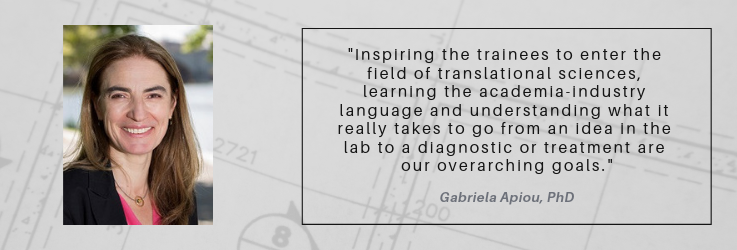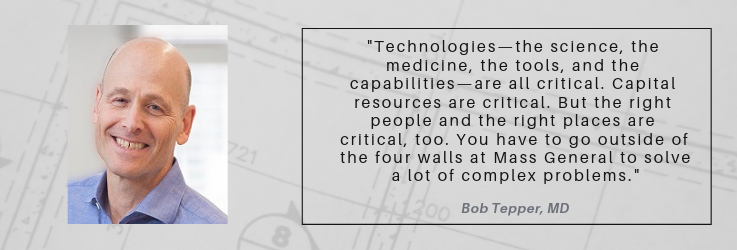Bridging Academia and Industry: Translational Research Education Program
Strategic Alliances Initiative
The Strategic Alliances initiative is a cornerstone of the Mass General Research Institute’s mission to help scientists engage in more productive and long-lasting collaborations with industry at all stages of their work: from fundamental research to proof of concept, development, and transfer to market and patient care.
An educational program to foster collaborations between academia and industry and support a new generation of translationally-minded scientists.
What does it take to build a bridge?
Bridges are complex structures that require contributions from many fields of expertise—from architects and engineers to steel and concrete workers.
While the bridge-building process can be long and challenging, the benefits are immediately clear. Bridges create new connections between areas that were previously separated by distance, allowing for the faster and easier exchange of resources, people and ideas from one side to the other and back again.
It seems appropriate, then, that the leaders of a new translational research training program at the Mass General Research Institute would use bridge building as a central theme for their program.
The bridge they hope to create is symbolic one that connects scientists and clinicians from Massachusetts General Hospital to their colleagues in the biotech, pharmaceutical and venture capital industry, to translate promising research discoveries into new diagnostics and treatments for patients.
Whether you are building a physical bridge or a conceptual one, both require a commitment to working as a team, a clear understanding and focus on the final goal, the determination to press on when new challenges arise, and the strength to withstand the push and pull of outside forces.
This is one of the key messages that Gabriela Apiou, PhD, Director of Strategic Alliances for the Mass General Research Institute and Bob Tepper, MD, Partner, Third Rock Ventures, share with trainees at the start of the Bridging Academic with Industry educational program.

In a recent interview, Tepper, who trained and conducted research as a faculty member at Mass General before transitioning to the biotechnology and venture capital fields, and Apiou, who trained as a scientist and conducted research in industry before joining Mass General, shared their vision for the course.
"This program is about establishing a new culture and field of investigation," Apiou says. "Inspiring the trainees to enter the field of translational sciences; learning the academia-industry language; and understanding what it really takes to go from an idea in the lab to a diagnostic or treatment are our overarching goals."
"We have an incredible biomedical ecosystem here in Boston, it's probably unique in the world. It has some of the best hospitals in the world and some of the best medical research." Tepper says. "The biotechnology industry has been growing in this area for several decades and has been recently complemented by the arrival of large pharmaceutical companies."
"While these two worlds co-exist, they don't always interact," Tepper notes. "Whether you're at Mass General, or a biotech or pharmaceutical company, it's not clear that you have all the contacts you need to foster collaboration and innovation—both within your institution and across these organizations."
"The need for multiple groups—basic scientists, physicians, business leaders, regulatory people—to work together to come up with these solutions has never been greater."
Details of the Program
The education program consists of two key parts. The first is an didactic program designed to teach participants the fundamentals of translation, research and development planning, business development and commercialization from both the academic and industry perspective.
Through lectures and case studies that illustrate both success stories and cautionary tales, the program provides trainees with a better understanding of the scope of resources that are needed to bring a discovery from the lab to the market.
"For example, if we are talking about a project that will take $60-$100 million and the investigator believes it is possible to do this with $3 million, we want to say; 'No, that’s not the right way to think about this, because that experiment has been done hundreds of times, and we know the answer to that,'" Tepper says.
"That's what we want to engender in this program, for people to get a realistic sense of what it takes to develop their ideas to their fullest—what type of community they would need."
The second part of the program is a project competition, where trainees identify and pitch important problems, form teams and work with faculty members to create solution-driven project proposals. The teams compete for a one-year $150,000 award to perform relevant research and develop a go-to-market plan.

Making Connections
By convening translationally-minded leaders from academia and industry together as co-instructors for the program, Apiou and Tepper hope to build connections across the entire translational science ecosystem.
"Technology—the science, the medicine, the tools, and the capabilities — are all critical. Capital resources are critical. But the right people and the right places are critical, too," Tepper says. "You have to go outside of the four walls at Mass General to solve a lot of complex problems."
53 Mass General Investigators Named Highly Cited Researchers of 2023
According to Clarivate Analytics’ Highly Cited Researchers Report
Support Research at Mass General
Your gift helps fund groundbreaking research aimed at understanding, treating and preventing human disease.
Strategic Alliances Initiative
The Strategic Alliances initiative is a cornerstone of the Mass General Research Institute’s mission to help scientists engage in more productive and long-lasting collaborations with industry at all stages of their work: from fundamental research to proof of concept, development, and transfer to market and patient care.
